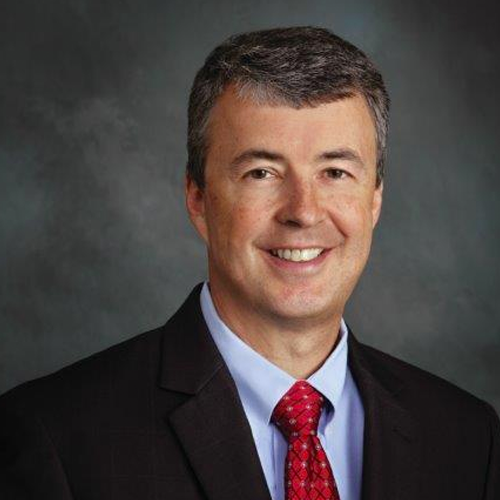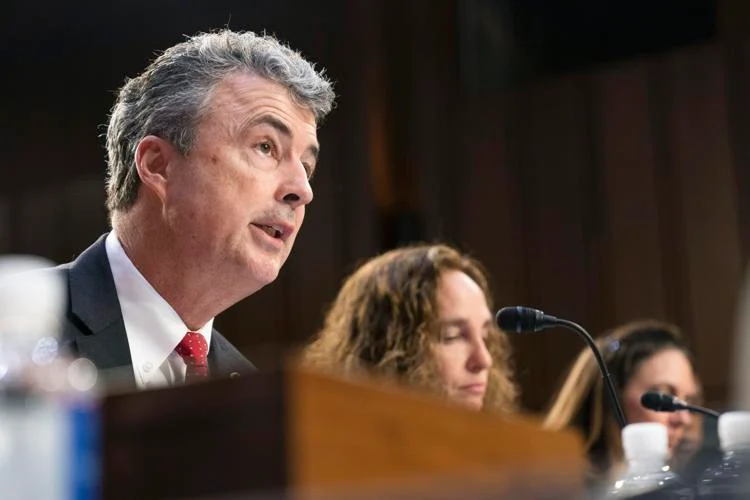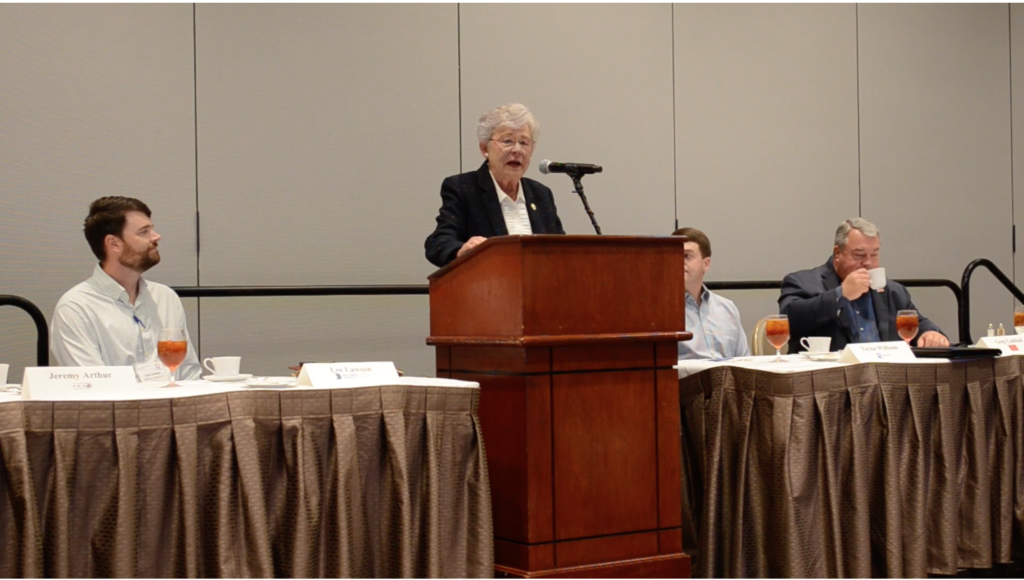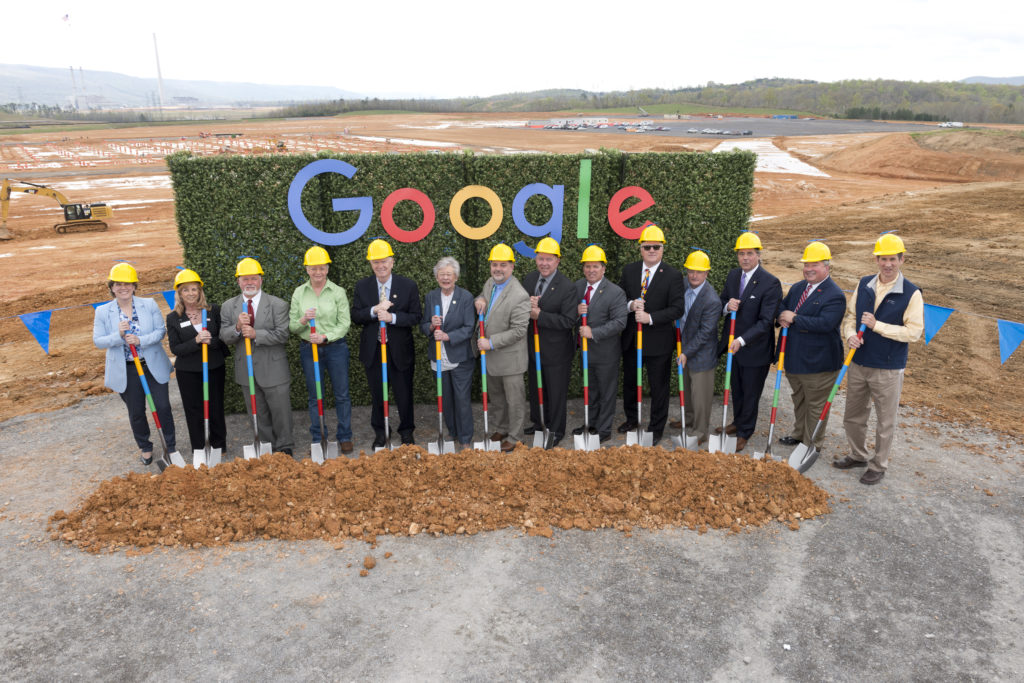Steve Marshall announces $7.6 million settlement with Google to protect consumer location privacy

On Monday, Attorney General Steve Marshall announced that Alabama, along with 39 other states, has reached a $391.5 million multistate settlement with Google over its location tracking practices relating to Google Account settings. Alabama will receive $7.6 million from the settlement. “Google bases its business upon the collection of personal data, including location tracking,” said AG Marshall. “Google uses the personal and behavioral data it collects to build detailed user profiles and target ads on behalf of its advertising customers. Location data is among the most sensitive and valuable information Google collects. Even a limited amount of location data can expose a person’s identity and routines and can be used to infer personal details. Unfortunately, until now, the tech giant has failed to adequately safeguard user location privacy.” Attorney General Steve Marshall Announces 40-State Settlement with Google to Protect Consumer Location Privacy https://t.co/JwyzvcIogn pic.twitter.com/kAGWK6TVEg — Attorney General Steve Marshall (@AGSteveMarshall) November 14, 2022 “As a result of our multistate settlement, Google will be required to allow users to have more control of their own information, to easily turn on or off tracking or sharing, and Google must make their account settings more accessible, transparent, and understandable,” Marshall explained. “They must provide links to clear and understandable information, and they must end any sharing of precise location data with third parties without express consent of the user. This historic settlement is an important milestone in restoring consumer online privacy.” The attorneys general opened the Google investigation following a 2018 Associated Press article that revealed Google “records your movements even when you explicitly tell it not to.” The article focused on two Google account settings: Location History and Web & App Activity. Location History is “off” unless a user turns on the setting, but Web & App Activity, a separate account setting, is automatically “on” when users set up a Google account, including all Android phone users. As detailed in the settlement, the attorneys general found that Google violated state consumer protection laws by misleading consumers about its location-tracking practices since at least 2014. Specifically, Google caused users to be confused about the scope of the Location History setting, the fact that the Web & App Activity setting existed and also collected location information, and the extent to which consumers who use Google products and services could limit Google’s location tracking by adjusting their account and device settings. The settlement requires Google to: • Show additional information to users whenever they turn a location-related account setting “on” or “off;” • Make key information about location tracking unavoidable for users (i.e., not hidden); • Give users detailed information about the types of location data Google collects and how it’s used at an enhanced “Location Technologies” webpage. The settlement also limits Google’s use and storage of certain types of location information and requires Google account controls to be more user-friendly. Google still faces an anti-trust lawsuit from the U.S. Justice Department. Alabama was joined by attorneys general of Alaska, Arkansas, Colorado, Connecticut, Delaware, Florida, Georgia, Hawaii, Idaho, Illinois, Iowa, Kansas, Kentucky, Louisiana, Maine, Maryland, Massachusetts, Michigan, Minnesota, Mississippi, Missouri, Nebraska, Nevada, New Jersey, New Mexico, New York, North Carolina, North Dakota, Ohio, Oklahoma, Oregon, Pennsylvania, South Carolina, South Dakota, Tennessee, Utah, Vermont, Virginia, and Wisconsin. Marshall was re-elected to his second term last week with 67.91% of the vote defeating Democratic nominee Wendell Major (32%). Marshall was the longtime district attorney in Marshall County prior to his appointment as AG in 2017. To connect with the author of this story, or to comment, email brandonmreporter@gmail.com.
AG Steve Marshall joins coalition to issue stern warning to Google

A stern warning has been issued to one tech company regarding the internet, Alabama Republican Attorney General Steve Marshall said. The state’s top law enforcement official has notified Google, telling the tech giant not to block or remove crisis pregnancy centers in the state from online searches for abortion services. Marshall said such action by the company could open Google to investigations into antitrust laws and religious discrimination. “Google accounts for more than 90% of all internet searches in the United States,” Marshall said in a release. “It also holds a dominant position in the market for online advertising. This dominant market position comes with a tremendous responsibility to Google’s users and to the American public. Google once recognized its outsized public duty in its corporate motto, ‘Don’t be evil,’ and its commitment to ‘provide … users with unbiased access to information.’” Marshall said “several national politicians,” unfortunately, are seeking to use Google’s market power “by pressuring the company to discriminate” against pro-life crisis pregnancy centers in search results, online advertising, and other products, such as Google Maps. “If Google fails to resist political pressure from those on the left and bow to their demands to censor or block crisis pregnancy centers, then we will act swiftly to protect American consumers,” Marshall said in the release. In a letter to Google, Marshall and the attorney generals gave a very clear warning. The letter, in part, reads, “If you comply with this inappropriate demand to bias your search results against crisis pregnancy centers, our offices will (1) conduct thorough investigations to determine whether this suppression violates the antitrust laws of the United States and our States; (2) investigate whether Google’s conduct amounts to an unlawful act of religious discrimination under state law; and (3) consider whether additional legislation – such as nondiscrimination rules under common carriage statutes – is necessary to protect consumers and markets.” According to the release, crisis pregnancy centers are charities that are private and show compassion and practical support to women. Those centers, in 2019, provided services to more than 1.8 million people and $266 million in services for little or no cost to women, including ultrasounds, STD testing, pregnancy tests, parenting, and parental education classes. Marshall joined other Republican attorneys general from Arizona, Arkansas, Indiana, Kansas, Kentucky, Louisiana, Mississippi, Missouri, Montana, Nebraska, Oklahoma, South Carolina, Texas, Utah, Virginia, and West Virginia in penning the letter. Republished with the permission of The Center Square.
Google plans solar energy to offset Alabama, Tennessee data centers

To ensure that electricity used by their new data centers in Alabama and Tennessee is matched 100 percent by renewable energy, Google has announced plans to purchase the output from two new solar farms. “Located in Hollywood, Alabama and Yum Yum, Tennessee, the two biggest solar farms will be able to produce around 150 megawatts each,” Amanda Corio, Google’s Senior Lead of Energy and Infrastructure wrote in a blog post. “These solar sites will be among the largest renewable energy projects in the Tennessee Valley region, and the largest solar farms ever to be built for Google. Thanks to the abundant solar power generated by these new farms, electricity consumed by our data centers in Tennessee and Alabama will be matched with 100 percent renewable energy from day one, helping us match our annual electricity consumption as we grow.” Data Center Dynamics reports that google has invested nearly $5 billion in renewable energy with more than 30 long-term contracts. The Alabama solar farm will be in Hollywood near Scottsboro and the data center, expected to be online later this year, will be near Huntsville.
Checking in: What has Birmingham Mayor Randall Woodfin been up to?

Ever wonder what your mayor been up to each month? Sure you may have helped elect them, but what happens after that? Alabama Today has you covered. Each month we’ll highlight what the Yellowhammer State’s Big 5 mayors have been doing in an effort to hold them accountable and keep things more transparent. In the last month, Birmingham Mayor Randall Woodfin has called upon the EPA, penned a letter to Arnold, Pa. Mayor Karen Peconi, and announced the completion of another campaign promise among other things. Here’s what he’s been up to for the last month: July 16 Woodfin sits down in front of a camera to answer frequently asked questions about the 2018 Fresh Start Amnesty Program on Facebook. July 18 Woodfin visits the Ironworks Local 92 training facility; chartered in 1906 “Local 92 helped build the skyline that is Birmingham,” reads the company’s website. “This morning I got the opportunity to tour the Ironworkers Local 92 training facility. Local 92 hands built Sloss Furnace, the Alabama Theater, Tutwiler Hotel and more,” Woodfin posted on Facebook. “Their four-year, $189 program will teach you the trade that built this city.” Woodfin announces the “100 Homes, 100 Days” project, a partnership between the Neighborhood Revitalization Fund and Neighborhood Housing Services to renovate 100 homes in the Birmingham area drastically in need of repair. “Our plan is to bundle our work to transform entire blocks instead of renovating one home on a street surrounded by other blight,” Woodfin said in a press release. “This reaffirms our commitment to giving all 99 neighborhoods a fresh start. As additional economic development projects pay off in Birmingham, resources from those projects will be identified and committed to the fund.” July 20 In an effort to increase transparency, Woodfin launches the Boards and Agencies web portal a complete online directory listing all active boards, agencies and commissions affiliated with the city; the first of its kind for the city of Birmingham. “Making appointments to boards and agencies is one of the most important and influential powers the mayor and city council possess. Ensuring we are appointing people to boards with a clear understanding of their fiduciary role is absolutely vital,” Woodfin said in a press release. “The Mayor’s Office places a clear expectation on understanding our mission of ‘Putting People First’ and our core values of customer service, efficiency, effectiveness, accountability, and transparency. We need to have the same expectations for our board members.” July 21 Woodfin attends the 23rd annual Back to school R.E.S.P.E.C.T. Rally hosted by Pastor Green and More Than Conquerors Faith Church. July 24 The Mayor’s office announced the completion of another campaign promise to promote transparency and accountability by introducing the Open Checkbook portal on the city’s website. The Open Checkbook documents Birmingham’s budgeting and expenditures dating back to fiscal year 2009. The portal consists of nearly a million pieces of data per fiscal year. “The Open Checkbook portal is helping us uphold our campaign promise of a transparent government,” Woodfin said. “I encourage everyone to visit the portal and see exactly how we’re directing our resources to make Birmingham stronger.” July 26 Woodfin penned a letter to Arnold, Pa. Mayor Karen Peconi expressing his concerns over what he called her “deliberate misrepresentation” of the 1963 civil rights demonstrations in Birmingham. Peconi came under fire after her controversial Facebook post during the public protests in Pittsburgh following the death of Antwon Rose — a 17 year-old African-American man shot and killed by a police officer in Pittsburgh in June. The officer has since been charged with criminal homicide and awaits trial. After learning of Peconi’s comments, Woodfin wrote an open letter her in an effort to encourage “constructive reflection,” on her part. “I am writing as the mayor of Birmingham, Alabama, because you posted and commented on a photograph taken during the civil rights demonstrations that took place in our city in 1963, in a way that completely misrepresented the purpose and meaning of those historic events,” Woodfin wrote. “Today, we in Birmingham take tremendous pride in our city’s role in advancing the causes of justice and equality for all Americans. And, even as we recognize the distance our nation, more than a half-century later, still has to travel along that road, we take pride in Birmingham’s progress and our ongoing emergence as a city of growth and opportunity for all. We honor our past and proudly and actively commemorate the history that was made in our streets — but our eyes and our actions are fixed firmly on the future.” July 27 Joined by former boxer and four-time heavyweight champion, Evander Holyfield, Woodfin visited with senior citizens at the Shepherd Center in Birmingham. “I’m very familiar with the importance to staying active at any age. When I was younger, my grandmother stayed with my family the last nine years of her life. It was a rewarding time for me,’’ Woodfin said in a press release. “I encourage every resident to seek out and experience the wisdom and talent our seniors have to offer.’’ On this day, Woodfin also presented Birmingham’s new Police Chief Patrick Smith with his badge during his official swearing-in ceremony. “I am proud to present our Chief of Police Patrick Smith with his badge during the official swearing-in. Thank you for your leadership chief,” Woodfin posted on Facebook. August 4 Woodfin spoke on a panel, and provided the closing keynote’s speech for the Netroots Nation national event. Drawing over 3,000 participants from across the nation, the Netroots Nation is the largest annual conference for progressives. Online and grassroots activists attend panels, training sessions, keynotes speeches, social events and more. “Today I’m speaking on a panel at Netroots Nation about Safeguarding Internet Freedom. This is a conversation about access. ISPs should not be the gatekeepers of what our citizens can and cannot access on the internet. The internet is the public library of the 21st century. We can not allow that free and open internet to be compromised,” Woodfin posted on his Facebook page. August 6 Woodfin hops around Birmingham, welcoming children to their first day of school at Hemphill Elementary, attending and speaking at Google’s free workshops at the Birmingham
Kay Ivey to Alabama economic developers: “Momentum is on our side.”

Alabama’s two main economic development leaders urged state economic developers to continue to evolve and advance to help keep the momentum Alabama has enjoyed in landing and expanding industry. Alabama Gov. Kay Ivey and Alabama Commerce Secretary Greg Canfield addressed the 2018 Summer Conference of the Economic Development Association of Alabama Monday. Both had much to brag about. Alabama’s economy has roared back since the Great Recession a few years ago to post the lowest unemployment in state history and some of the biggest names in business now — or soon will — have significant operations in the state. Gov. Kay Ivey addresses the 2018 EDAA Summer Conference from Alabama NewsCenter on Vimeo. Consider: Alabama unemployment in October 2009 was 11.8 percent. In May 2018, it was 3.9 percent. Alabama’s gross domestic product (a measure of total economic output) was 2.5 percent in 2009. In 2017, it was 3.3 percent. In 2017, the state announced economic development projects with $4.4 billion in capital investment that will create an estimated 15,456 jobs. Monday, AIDT, the state’s lead workforce training department, announced it is working a record number 135 projects with 30,000 jobs. Alabama Commerce Secretary Greg Canfield shared his cautious optimism with leaders at the Economic Development Association of Alabama summer conference. (Mike Tomberlin/Alabama Newscenter) “Times have gotten better. The strategy is paying off,” Canfield said. “But we’re not yet where we want to be.” Ivey credited economic developers at the local level across the state with helping achieve the success. “These jobs are in large cities like Mobile and Birmingham, but they’re also in smaller towns like Brewton and Bridgeport,” she said. “We’ve celebrated announcements and groundbreakings with companies like Google and Facebook and Boeing and with some growing companies, too, like Kimber Firearms and AutoCar. Y’all, momentum is on our side and I want Alabama to be every company’s first choice for their location.” Ivey said corporate CEOs from around the world tell her they are successful in Alabama because of the quality and productivity of their employees in the state. Part of keeping the momentum the governor talked about is gearing economic development toward the jobs and businesses of the future. “We’re really focused a lot on technology and innovation, the growth of entrepreneurship,” he said. “It’s really about growing the knowledge economy in Alabama that will support the industry that’s here.” Canfield said the state is about to get a major tool to work with in that regard. Alabama EPSCoR, which represents research universities and private institutions like Southern Research and HudsonAlpha, is close to unveiling a gamechanger. “EPSCoR is putting together and about to launch a digital database that’s searchable so that economic developers and site consultants and companies who want to be able to find out where they can link their product development and their own internal research with that of public universities or private research institutions, they will actually be able to go into this database and if they want to find something like who is doing research right now on composite materials, who is doing research on nickel alloys in the aerospace sector, who is doing additive manufacturing and powder alloy research in technology development? They can actually go in and be linked to the specific researchers doing that work, not just at the university level, but at the researcher level,” Canfield said. “So at the state level, we will be able to provide that connectivity. This will really help us advance economic development to the next level.” Canfield’s optimism is due, in part, to education at all levels of the state (K-12, community colleges and universities,) along with worker training initiatives working closely to complement each other’s efforts. “I think the state has never been better aligned in terms of workforce preparedness,” he said. “That terminology really includes everything from education – the academic side of education but also skills development and certifications – anything that’s industry-specific, industry-recognized and equips Alabamians with the right tools necessary to be able to do the right jobs.” With that alignment, Ivey wants to ensure education and worker training are looking ahead to what’s needed. “We’ve got a great workforce, but we have got to keep the pipeline full with folks trained with higher skills to meet the jobs that we know are coming, and some of them are already here,” Ivey said. Many of those next-generation jobs will be in aerospace. Ivey said the state delegation’s recent efforts at the Farnborough International Air Show are paying off. “Even more good news may be on the horizon for Alabama,” she said. “I’m proud of what Airbus and Bombardier are doing to finalize their plans to create a second assembly line in Mobile for the A220 series. And, also, Leonardo is still in the running to be awarded the contract from the United States Air Force to build the T-100 trainers. Y’all, if Leonardo is successful and gets that contract, there are going to be 750 new jobs in Macon County. That is huge.” Canfield, too, is hopeful for the state’s chances on the T-100 trainer. “I am so eager to hear positive news for Tuskegee and Macon County,” he said. Ivey said watching Alabamians get good-paying jobs is the true goal of economic development. “All of this good news gives me great hope about our fine state,” she said. “We all want Alabamians to be able to achieve their dreams, live in a safe environment, have a quality of life and create a reputation for the state of Alabama that is envied worldwide.” Greg Canfield at the 2018 EDAA Summer Conference from Alabama NewsCenter on Vimeo. Republished with the permission of the Alabama Newscenter.
Google to offer digital skills workshops in three Alabama cities

Google says it will offer free digital skills workshops in Alabama. AL.com reports Google announced Monday it’s bringing its “Grow with Google” tour to three cities starting with Birmingham on Aug. 6. The other two workshops are Aug. 8 in Opelika and Aug. 10 in Scottsboro. Google’s head of community engagement Erica Swanson says the workshops and one-on-one coaching are designed to help job seekers and small businesses. She says Google sees the training as an extension of its existing presence in Alabama. The Internet company began engaging with some public libraries after announcing that it was building a $600 million data center in Jackson County. Google says roughly 11,000 Alabama businesses and nonprofits generated more than $700 million in economic activity in 2017 using its search and advertising tools. Republished with the permission of the Associated Press.
Birmingham-based national women’s group takes on Microsoft, big tech

With Gov. Kay Ivey at the helm, Alabama has been hard at work luring new businesses to the state like ants to a picnic. It seems like every time you turn around, another big business it’s announcing its arrival or expansion in the Yellowhammer State. Just this week, Ivey on Thursday announced Facebook will invest $750 million to build a data center in Huntsville, creating 100 high-paying jobs. In April, Google broke ground on a new $600 million data center in Jackson County, Ala. It is expected to add upwards of 100 well-paying jobs with highly technical skill sets, including computer technicians, system administrators, software technicians and engineers. But one Birmingham-based national women’s is questioning at what price tech jobs, like these, are coming to the state. Women United — a group that describes itself as a next phase of the #MeToo movement, dedicated to defending all women by shining a light on men who take advantage of women, thinking they can hide or are above the law — is calling out the tech industry and companies like Microsoft for its long history of sexual harassment and discrimination challenges in the workplace in hopes of protecting Alabama women. “With the growth of tech companies has come a painful reality that women in the field face sexual harassment and discrimination challenges other industries have long since put behind them,” wrote the visionary behind Women United, Catrena Norris Carter in an AL.com op-ed. The 30-year veteran of both the civil rights and women’s movements in America isn’t accepting the news of new tech jobs without holding the industry accountable. The numbers don’t lie Sexual harassment runs rampant in the tech industry. Seventy-eight percent of women founders say they have been harassed or know someone who was, according to First Round Capital’s annual State of Startups survey. Discrimination is an issue as well. According to CNN tech, “89% of those making investment decisions at the top 72 firms are male, according to one survey. And in 2016, VCs put $64.9 billion into male-founded startups, compared to $1.5 billion into female-founded startups, according to new data from PitchBook.” And it’s not just taking place at startups. According to a filing, Women at Microsoft filed 238 complaints with the company’s HR department between 2010 and 2016, including 108 complaints about sexual harassment and 119 about gender discrimination. There were also eight complaints of retaliation and three about pregnancy discrimination, the filing said. The tech giant is currently in the midst of a court battle over these allegations. Looking for accountability Women United it looking to protect Alabama women from being added to the shocking statistics of sexual harassment and discrimination. “As our state–and, more specifically, our big cities, including Birmingham, Huntsville and Mobile–looks to attract and grow tech firms, we must demand accountability regarding discrimination and sexual harassment,” Carter continued. “When lawmakers are cutting deals, they must ask those companies what they are doing to foster a safer and healthier environment for women.” “We don’t need that culture in Alabama–no matter how many jobs and tax dollars it brings,” Carter concluded.
Google breaks ground on $600M Alabama data center

Google executives joined Governor Kay Ivey, Alabama 5th District U.S. Rep. Mo Brooks at a groundbreaking ceremony on Monday to mark the official start of construction on a $600 million data center that will bring as many as 100 jobs to the northeast Alabama community of Bridgeport. Google’s Jackson County data center will feature state-of-the-art energy efficiency technology. The company has also committed to purchase enough renewable electricity to match 100 percent of the facility’s power consumption. The facility will be the company’s 14th data center site globally and the eighth in the U.S., the second new U.S. location since 2007. “Google is committed to investing in Jackson County to create new economic and educational opportunities for the people of Alabama and the surrounding region.” said Dr. Nan Boden, Senior Director and Head of Global Technology Partners for Google Cloud. “As a native Alabamian, I am so proud to be part of the effort to bring this Google data center to life in the coming months and years.” The Alabama data center will act as an engine for internet traffic, operating in a network that keeps the Google search engine and company products such as Gmail and YouTube up and running for global users 24 hours a day, seven days a week. Alabama officials said the Google data center will provide a major economic boost to the Jackson County area, beginning with hundreds of construction jobs as the facility is built. The data center’s highly technical workforce will number between 75 and 100, with the potential for growth in the future. “As one of the world’s most dynamic and innovative technology companies, Google’s products touch billions of people across the globe every single day,” said Ivey. “We’re proud that Alabama is playing an important role in Google’s future growth, and we look forward to seeing this data center operation help power that growth.” Google selected the Jackson County site because it offered the right combination of energy infrastructure as well as developable land. In addition, both state and local officials worked very hard to forge a partnership with the company and advance the data center project. “I’m thrilled to join with Google today as they break ground on their data center in Jackson County,” added Brooks. “It’s great to see companies like Google recognize what we in the Tennessee Valley have known all along — that we have a tremendous pool of talent in Northern Alabama and that this is a wonderful place to live and work.” Once the Google facility opens, it will be Alabama’s first large-scale data center. It will also add a new dimension to Jackson County’s economy, which today has a heavy concentration of manufacturers producing items ranging from carpets to auto parts. “This is a big day for Bridgeport because it helps our city in many different ways,” weighed in Mayor David “Bubba” Hughes. “Having Google in our community will bring us great jobs and offer real opportunities for our young people. Google is a generous supporter of schools, and the company’s presence will help us recruit other high-tech companies. No doubt about it — this is a game-changer for us.” As part of its commitment to local communities, Google also announced onsite that it would be donating $100,000 to the Jackson County School District for the growth and development of the region’s student STEM programs. “We are so excited to become a part of Jackson County, and are committed to helping the community thrive,” said Brenda Standridge, Hardware Operations Manager and Site Lead. “I look forward to seeing how we will continue to work with community leaders to develop new opportunities for the children in this school district.” “With this generous grant, Google has again proven itself a community partner and a supporter of the Jackson County School District,” added Kevin Dukes, superintendent. “We are thankful for their ongoing support of our children’s futures and are thrilled that they will now call this area home.” Google’s newest data center is being constructed on over 500 acres adjacent to the site of the decommissioned Widows Creek coal-fired power plant once operated by the Tennessee Valley Authority (TVA). Google is partnering with TVA to source renewable power and will utilize the site’s existing electricity transmission lines to enhance the data center’s reliability and bring in clean power. “The milestone we celebrate today is the result of government, business and community leaders working together with TVA to bring good jobs and quality investment to our region,” said TVA president and CEO Bill Johnson. “Google’s newest facility on the site of TVA’s former fossil plant at Widows Creek ensures that this storied location continues to be a landmark for technology and economic development for the people of North Alabama.” Repurposing the Widows Creek site and committing to match 100 percent of their electricity consumption at the Alabama data center with renewable energy purchases reflects Google’s longtime leadership on renewable energy. The company was one of the first to begin buying renewables on a large scale in 2010 and recently announced that it achieved 100 percent renewable energy for its operations in 2017.
Google schedules groundbreaking on Alabama Data Center

Construction crews will break ground Monday, April 9 on a new $600 million Google data center in Jackson County, Ala. The Alabama Data Center is being built on 350-acres off of County Road 96 in Bridgeport, Ala on the on the grounds of TVA’s Widows Creek Steam Plant. The site will be the internet giant’s newest U.S. Data Center. It is expected to add upwards of 100 well-paying jobs with highly technical skill sets, including computer technicians, system administrators, software technicians and engineers in Jackson County. Google announced plans to construct a Data Center in Jackson County on June 24, 2015. Its 14th data center site globally, Google’s Alabama Data Center will represent the eighth of its kind in the U.S. and only the second new U.S. site since 2007. Upon completion, employees of the center will work to keep Google Search, Gmail, YouTube and many other Google applications operational 24-hours a day for users across the globe. According to the Alabama Department of Commerce, “at the Jackson County site, Google will repurpose TVA’s decommissioned coal-fired Widows Creek Power Plant. And like nearly all of the tech giant’s other data centers, the facility in Bridgeport will be 100 percent powered by renewable energy — at no cost to efficiency.” The invitation-only event includes guests Gov. Kay Ivey, Alabama 5th District U.S. Rep. Mo Brooks, Google representatives and leadership, Jackson County elected officials, Jackson County school district leadership, along with business and community leaders.
Uber, Google develop app for Election Day rides

Election Day is only days away, and Uber and Google have teamed up to help voters cast ballots. As part of its ongoing campaign to boost the turnout among Uber users, the San Francisco-based ride-sharing service has worked with Google a special in-app feature available Nov. 8 that will help locate polling locations – and quickly request a ride with a simple tap on the smartphone. On Election Day, Uber users will see a reminder to get out and vote; the unique feature will let them enter the address where they are registered, helping to locate the appropriate polling sites by hitting the “Find Your Polling Place” before requesting a ride. New Uber users riding for the first time can enter the code VOTETODAY for $20 off. Unlike other Uber promotions, trips will be subject to standard charges, with no free or discounted rides for existing users on Election Day. According to the Uber blog: “Given the important decision people around the country will make on Nov. 8, we wanted to make getting to and from your polling place easier than ever.”
Alabama business roundup: Headlines from across state – 8/3/16 edition

According to federal figures where does lotto money really go? Who’s hiring 500 new employees? Answers to these questions and more in today’s business roundup: AL.com: Amid Alabama lottery proposal, federal figures show where lotto money really goes Alabama is apparently so broke that it might be forced to adopt a lottery to raise funds, giving up on a longtime abstinence that would see it join a group of 44 other states where the ‘game of chance’ is not only legal, but raising crucial revenues for services such as education, tax relief and infrastructure costs. Each year tens of billions of dollars are raised across the country by lotteries in order to plug holes in state budgets, allowing lawmakers to keep taxes low and state agencies functioning. But despite claims by most states that lotteries are largely charitable organizations, the latest (2014) U.S. Census Bureau statistics on lottery revenues show that only around 33 percent of money raised by the 44 states is made available to spend on state services. The rest, around 62 percent, is given in prizes, while around 5 percent is set aside for administrative fees. As part of his pitch for an Alabama lottery, Gov. Robert Bentley made an impassioned plea late last week claiming that a state lottery would bring in as much as $225 million a year, which he said would be spent on services for children, the mentally ill, law enforcement and “those in the most need,” as well as the contributing to the state’s General Fund. “The time has come for us to find a permanent solution,” said Bentley. “This solution will provide funding that we can count on for year after year without ever having to raise your taxes or put one more band-aid on our state’s money problems.” And those so-called money problems are becoming more acute every year as Alabama looks to deal with debt that exceeds $60 billion. While the scant details of Bentley’s lottery spending plan are generally in line with how other states claim they spend lotto revenues, his figure of $225 million would depend on what percentage of lottery revenue the state will allocate to prizes, administration and to state services. In nearby Louisiana, which has a similar population and economy to Alabama, the state generated around $432 million in lottery revenues in 2014, according to the U.S. Census Bureau. Of that, $160.5 million went to the state treasury, $237 million was given out in prizes and $26 million spent on administering the lottery. What isn’t immediately clear is whether Bentley’s $225 million estimate is before or after administrative costs and prizes are discounted. The North American Association of State and Provincial Lotteries offers a general view of how each state spends its lottery revenue, although there is little centralized documentation that shows the exact details of how every dollar is spent. However, some state lottery websites do offer more information on post-prize expenditure. For example, California directs around $1.6 billion of its state services-assigned revenue toward education, while in Pennsylvania almost all of the $1 billion it raises for state spending is used exclusively on caring for pensioners. But even these high figures account for a far less amount that what is given out in prize money. But there are some states that buck the big-prize trend. For example, Rhode Island, West Virginia, Oregon, and South Dakota divert around 60 percent of all lottery cash raised toward state-funded programs, such as education, tourism, economic development, gambling addiction and tax reductions. Only a very small amount finds its way to prizewinners. In West Virginia, for example, $509 million of the $654 million pot was directed into state services in 2014, while only $111 million was given in prizes. The rest, $33 million, was spent on administrative costs. Whether or not Alabama will be similar to one of these states is yet to be seen. Read more here. Alabama News Center: How Google came to choose Alabama for its $600 million data center Getting Alabama to come out on top of Google’s own search results for its high-tech data center took thousands of emails and texts, 20 visits from the company to north Alabama and the last-minute signature of a mayor named Bubba. The key players in the recruitment of the $600 million Google data center to Jackson County gave a behind-the-scenes look at the twists and turns the project took before settling on 500 acres at a power plant that was shutting down. The recruitment was the subject of a panel discussion at last week’s Economic Development Association of Alabama summer conference. It was a project shrouded in secrecy. At various times, it went by the codename of “Project Zebra” and “Project Spike.” Officials involved in the recruitment had to sign nondisclosure agreements even though they didn’t know the name of the company. In April 2014, Tennessee Valley Authority project manager Spencer Sessions took the first call and began trying to find sites that matched the criteria. Bob Smith, project manager with the Alabama Department of Commerce, was brought in a few weeks later. He said Alabama had won a fair number of data centers the previous four years — projects that were heavy with capital investment because of the technology infrastructure, but don’t have the same number of employees as large manufacturing plants. Site Selection magazine, an economic development trade publication, had cited Alabama’s success in the data center arena. Smith said officials recognized that the state’s incentives were more geared toward manufacturing but needed to focus on data centers. The state passed such incentives in 2012. Alabama now had a new tool in the toolbox and waited for an opportunity to use it. Meanwhile, TVA had a site in Jackson County certified as ready for a data center. “We had this certified data center site right next to the community college,” said Dus Rogers, president and CEO of the Jackson County Economic Development Authority. The only problem is Project Zebra (or was it Project Spike by this time?) didn’t care for that site and wanted officials to think
Linda Cunningham: Martin Shkreli’s mom ought be snatching him bald

Pity Martin Shkreli’s mother. Don’t you know she just wants to snatch that boy bald? You know Shkreli, right? The 33-year-old brat-turned-hedge-fund-fraudster who bought a cheap generic drug and raised its price to the stratosphere and then rolled his eyes at a congressional committee this past week? Yeah, that one. And, if you’ve somehow missed him and the hand-washing compulsion that follows, Matthew Herper at Forbes has a bang-up profile from back in September. Or you can watch the arrogant smirking and eye-rolling here. Oh, heck, just Google or Twitter him yourself. There’s plenty out there. Back to mom. There must be a mom (and dad) around somewhere because, well, because there’s a Martin born on April 1, 1983. So, unless Martin is one giant April Fool’s joke, there are parental units somewhere, though I could find no references to them in an hour of online searching. Martin’s mom has to be beside herself right now. We mothers are supposed to love our kids, be there for them and generally be the ones who say things like “he was such a sweet boy. I can’t imagine his being so rude.” Uh, yeah, rude. That would be the word. Martin Shkreli is rude, crude and socially unacceptable, as my dear old dad used to say about some of my college neighbors. And I’m betting it’s all mom’s fault because, of course, it always is. A Facebook friend — also a mother of two about Shkreli’s age — posted this Friday morning: “O.K. I’ve had it with bad behavior and want to form a ‘Mom Squad’ to perform attitude adjustments for those who obviously weren’t raised properly. “First on my list: Pharma Bro. Had I been at yesterday’s Congressional hearing, I would have leaned behind Martin Shkreli and wiped that smirk off his face and made him apologize for his snarky behavior. Go ahead and plead the Fifth, Martin. Just do it with some dignity and respect. Who’s in on this crusade? Who needs a visit from the ‘Mom Squad’?” Seconds, and I mean, seconds, later a dozen moms (and one dad) shouted, “I’m in.” Moms know that smarmy, self-centered, eye-rolling smirk and we have to sit on our hands to keep from slapping it off. Bless his little heart, that Martin needs a mom to be all over him, slapping like white on rice, because he’s gotten way too big for his britches. He sure has way more money than sense, doncha think? Yeah, I think. And, I’m also thinking, wherever she is, it’s not mom’s fault. Or, at least, she’s going to get a pass from me, poor thing. Martin Shkreli’s one more in a lineup of self-made, arrogant, me-first pseudo-celebrities with more money than brains and more media addiction than compassion. These are men (and the occasional woman) with holes in their souls. There’s a bunch of them out there; at least half a dozen are running for U.S. president. And every one of them — except Jeb Bush, whose mama really would snatch him bald if he did such things — needs a visit from the Mom Squad. • • • Linda Grist Cunningham is editor and proprietor of KeyWestWatch Media LLC, a digital management solutions company, specializing in small businesses. She’s got a son around Shkreli’s age and he’d not dare roll his eyes in a congressional hearing.


